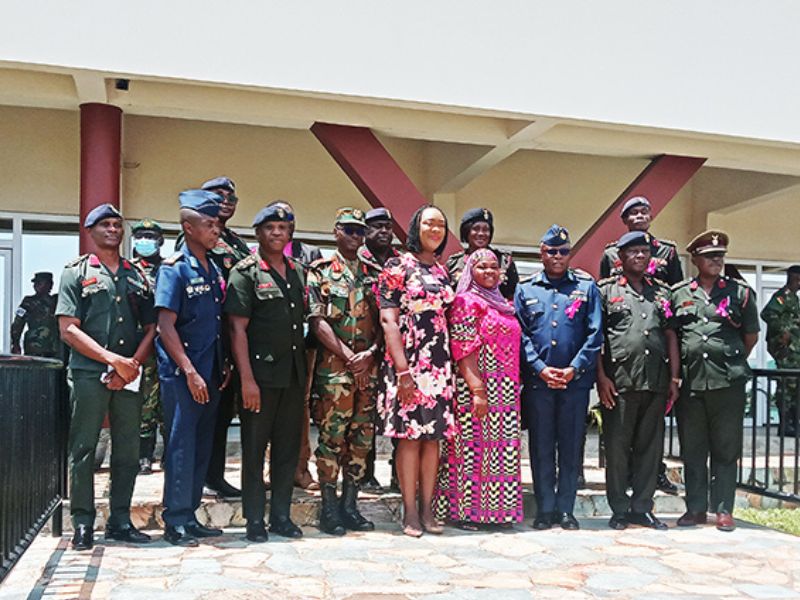
Reports from the Korle Bu Teaching Hospital (KBTH) and 37 Military Hospital indicate that the late reporting is the leading cause of death among women affected by breast cancer.
The health institutions, while marking Pink October – a mother dedicated for creating breast cancer awareness at the Burma Camp last week, said about 60 per cent (%) of all breast cancer related cases are reported at their advanced stages.

According to them, when such cases arrive at the centres, instead of giving the patients treatment, the health professionals are left with no option but to remove the cancerous breast or just manage the case, since the tumour has already affected other organs of the body.
The Chief Nursing Officer in-charge of the 37 Military Hospital, Colonel Patience Owusu Aidoo, speaking on the theme: “Early detection is key,” said breast cancer is not a terminal disease if reported early.
She said treatments available include Surgery; Lumpectomy (removal of tumour and some tissues) and Mastectomy (removal of the breast); Radiation therapy (killing of the cancer cells that were missed) and Chemotherapy (drug to attack the cancer cell).
However, she noted that many women after discovery of unusual lump in the breast or armpit would result to self-medication, traditional treatment and spiritual healing, and by the time they report to the hospital, it is too late.
According to her myths that men sucking women’s breast can prevent breast cancer has no scientific basis.
Col Aidoo indicated that although one-in-hundred men can also develop breast cancer, women are at high risk of having the tumour, especially after age 40 or using contraceptives after age 35, or being obese.
The Chief Nursing Officer added that although what causes a tumour to grow in the breast has not been discovered yet, some of the risk factors are abuse of alcohol and tobacco, hereditary and exposure to excessive radiation.
Her worries were that while there are about 4,500 cases of breast cancer in Ghana, stigma, reluctance to seek health attention, low education and awareness of the disease are pushing about 40% of the patients every year into their early grave.
While she advised the general public to develop habits, such as eating healthy and exercising, they must also “desist from looking for help from prayer camps and herbalists, instead of visiting the hospital for medical attention.”
Col Aidoo urged woman to pay attention to their breasts when it develops new lump on the breast or the armpit, the size changes, blood or odour liquid discharge, pulling in nipple, irritation or dumpling of breast skin and pain in the area of the breast.
Director of Clinical Psychology, Lt. Col A.F.K Tenteh added that since it is on record that breast cancer is the leading cause of death among women, there is the need for all hands to be on deck to fight its stigmatisation.He said patients must be encouraged to seek treatment to enable them survive the disease.
Lt. Col Tenteh thanked the government for adding cancer treatment to the list of the National Health Insurance, but pleaded that the gesture must be extended to mental health.
He said mental health cuts across all the health disciplines, for instance cancer patient needs to be mentally prepared before taking any decision with regard to treatment.
The annual breast cancer awareness programme is organised for personnel of the Ghana Armed Forces and their spouses.
This year’s event had other speakers addressing their audiences on topics, “Living beyond breast cancer, together we stand” and “Closing the curve gap.”
Delta Airline, BCI lead breast care campaign
Meanwhile, Delta Air Lines, in collaboration with Breast Care International (BCI) is offering a screening programme for women in Ghana, under the banner: ‘Kick out Cancer’ Campaign.
The campaign is designed to provide breast cancer education and screening to women, aged 20 and over, in communities across the country.
Persons whose diagnosis will prove positive would be offered treatment at hospitals, including BCI’s Peace and Love Hospitals and supportive counselling.
“Healthcare provision is one of the pillars of our community engagement strategy,” said Nicolas Ferri, Delta’s vice president EMEAI.
“We’re proud of the work we have done with BCI over the past six years and look forward to raising more awareness and facilitating treatment for women and men diagnosed with breast cancer in Ghana over the next 12 months,” he added.
BCI has organised community outreach programs in communities since 2002 to educate and improve knowledge, change attitudes and promote the importance of early detection of breast cancer.
Breast cancer screenings by way of clinical breast examinations are also offered free of charge at each screening session.
“Our partnership with Delta Air Lines to organise free countrywide breast cancer awareness program, is to rid low-income earning communities of the intolerable levels of breast cancer cases,” said Dr. Beatrice Wiafe Addai, Executive Director of Breast Care International.
“This initiative, which supports the Sustainable Development Goals (SDGs) for ‘Good Health’ is driven by a passion for women in these communities to receive the much needed breast care education, and by extension counselling and treatment.”
Data from the World Health Organisation (WHO) indicates that at 2.26 million, there were new cases of breast cancer worldwide in 2020 than any other type of cancer.
The WHO’s Globocan 2020 study found that breast cancer was also the most commonly diagnosed cancer in Ghana with more than 4,400 new cases. This was 18.7% of all cancer diagnoses.








